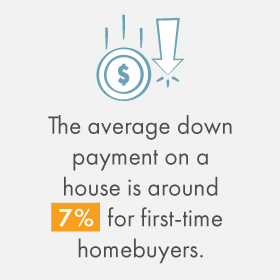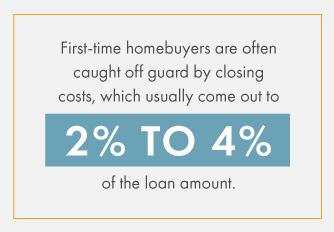In the realm of real estate, a down payment is the initial lump sum you pay when buying property. If you're thinking about entering the market but aren't sure how much you'll need to have in the bank, you've come to the right place.
At Consolidated Community Credit Union, we offer mortgage solutions for first-time homebuyers. Consider this your guide to saving for a down payment on a house.
 How much do I need to save for a down payment?
How much do I need to save for a down payment?
So, how much do you need? At the risk of sounding like every other real estate blog out there, well, it depends. Down payment requirements vary among different types of mortgages and are dependent on things like the property you're buying and your financial situation.
In most cases, you'll need to put down at least 3% of the purchase price, though it could be as much as 20%. The average down payment on a house is around 7% for first-time homebuyers. If you put 7% down on a $400,000 home, your down payment would be $28,000.
What's a good down payment on a house?
While there are exceptions to this rule, a "good" down payment is typically 20% or more of the purchase price. Why? It allows you to bypass private mortgage insurance (PMI). PMI is a type of mortgage insurance a lender may require you to pay. PMI protects lenders, instead of you, if you stop making payments on your loan. PMIs can tack on anywhere from $100 to $300 to your monthly mortgage payment.
Having said that, 20% down payments are becoming less common for first-time homebuyers. There are undeniable benefits to entering the market sooner than later, even if it means carrying PMI for the first few years.
Tips and considerations for saving for a down payment
Becoming a homeowner is an exciting milestone. But, navigating the world of mortgages can be a learning curve. While your loan officer will walk you through each step of the process, it's good to learn the basics before diving in.
Figure out how much you can afford
The first step in saving for a down payment is figuring out how much you can afford. Financial experts usually recommend keeping your monthly mortgage payment to no more than 35% of your household income. So if you earn $5,000 a month, you could afford up to $1,750 per month. On the other hand, if you're part of a dual-earning household that takes home $10,000 per month, you could afford monthly payments as high as $3,500.
Consider interest rates
Generally speaking, a larger down payment means you'll pay a lower interest rate. Why? Paying a sizable sum upfront tells lenders you're a less risky borrower.
How down payment affects monthly mortgage payment
Striving for a low interest rate is in your best interest. The difference of just 1% to 2% can save you a few hundred dollars per month and tens or even hundreds of thousands of dollars throughout the life of your loan.
Know the benefits of a small down payment
As we mentioned, putting 20% or more down allows you to avoid paying private mortgage insurance. However, there are benefits to making a smaller down payment, like being able to enter the real estate market sooner.
Some buyers put as little as possible down so they can use their savings for renovations. This can increase your home value and equity, potentially knocking off PMI sooner than later.
Additionally, if you're buying an older house, it's wise to have money set aside for repairs. The cost of fixing a leaky roof or replacing an appliance can be alarming when you're used to renting.
Account for closing costs First-time homebuyers are often caught off guard by closing costs, which usually come out to 2% to 4% of the loan amount. They can include things like mortgage application fees, appraisals, inspections, prepaid interest, and loan origination fees, to name a few. In some instances sellers cover buyers' closing costs. While this isn’t common, it’s worth asking.
First-time homebuyers are often caught off guard by closing costs, which usually come out to 2% to 4% of the loan amount. They can include things like mortgage application fees, appraisals, inspections, prepaid interest, and loan origination fees, to name a few. In some instances sellers cover buyers' closing costs. While this isn’t common, it’s worth asking.
Set a savings goal
We recommend setting a savings goal and figuring out how much money you need to set aside each month to reach it. For instance, let's say you want to buy a house in three years and figure you'll need $30,000 to cover a down payment and closing costs. You'll need to save $10,000 each year, which comes out to about $833 per month. First-time homebuyer savings accounts from CCCU
A house is one of the biggest and most expensive purchases of your life. To make saving easy, CCCU offers first-time homebuyer savings accounts with excellent dividends, an Oregon state tax break, and we’ll cover your appraisal fee (up to $700) if you get your mortgage through us. Not only that, but we have a range of mortgage tools and lending options with competitively low interest rates.
CCCU proudly serves members throughout the metropolitan area, including Multnomah, Yamhill, Clackamas, Columbia, Washington, Clark, Skamania, and Hood River counties. We have three physical branches in Portland and one in Hood River, convenient mobile banking, plus access to 5,600+ CO-OP Shared Branches and over 30,000 surcharge-free CO-OP ATMs nationwide!
Become a member today or contact us with questions about our mortgage programs.



